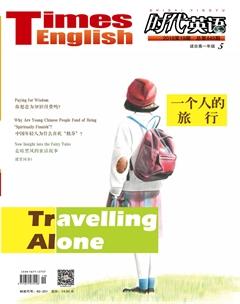跟踪导练(一)(1)
閱读理解
A
This is a true story in Guyana. One day, a child took some silver paper from a cigarette box. He rolled it into a tiny ball and pushed it up his nose. He couldnt get it out again. He ran crying to his mother. His mother couldnt get the paper out, either. A week later the paper was still in his nose. His nose began to have a bad smell.
So his mother took his child to the hospital. The doctor looked up his nose. She put a tiny steel rod (钢棒) into his nose and felt the paper. She said she would have to cut his nose to get the paper out.
The childs mother came home looking sad. She didnt want her child to have his nose cut. He was a handsome boy and the cut would make him ugly.
Next day, the childs mother took him to her friend Sidney. Sidney lived in a house with an old woman called May. She asked to see the child, so the child let her look up his nose. He closed his eyes.
“Yes, I can see it,” May said. “It will be out soon!”
As she spoke, she shook black pepper on the childs nose. He gave a mighty (有力的) sneeze and the paper flew out. His mother was surprised. May told her to take the boy to the sea for a swim. She said the salt water would go up his nose and stop the bad smell.
So the child didnt have to go to the hospital and have his nose cut.
1. How did the silver paper ball go into the boys nose?
A. He himself pushed it up his nose.
B. His mother put it into his nose.
C. It rolled into his nose itself.
D. A doctor put it in.
2. Why did the boys nose have a bad smell?
A. His nose was cut and gave out a bad smell.
B. The ball stayed in his nose for too long.
C. He didnt like to wash his nose.
D. He had a running nose.
3. What can help to stop the bad smell according to May?
A. Some medicine. B. Some black pepper.
C. Fresh air. D. The salt water.
4. Who helped the boy out in the end?
A. The boy himself. B. The doctor.
C. Sidney. D. May.
B
As a child, I always wanted to be “important”. I wanted to do something great that the rest of the world would be surprised at. I wanted to make my parents feel proud of me. I wanted to be the center of attention and stand out in a crowd. Naturally, in order to make these dreams come true, I thought out all of the noble (高尚的) jobs such as doctor, lawyer, firefighter and so on. By the way, I was six at that time. Finally, after many years of research, I found that engineers were cool.
By the time I was eight, I had already planned my professional career (職业生涯). I spent the next ten years trying to perfect my drawing skills through competitions and art classes. I enjoyed nearly every second of it. However, somewhere along the way my thought began to change. So much has changed.
Ive learned that life is about learning to accept yourself and let things flow in their most natural state. Success is about finding yourself and your own meaning in this world. I still want to make my parents feel proud of me, but Im more concerned about what I consider as important. I pay more attention to what I really want to do.
As an adult, Ive increasingly realized all the things to be afraid of in life. Ive realized my own limitations. Anyone with good reasoning skills soon begins to see the risk of looking for the “hard to reach” goal. It wasnt until I was twenty-two years old that I began to get in touch with my true self. As Albert Einstein said, “Once we accept our limitations, we go beyond them.” After accepting my true self, I can confidently take care of myself and find the way that is most suitable for me.
5. What was the authors goal when he was six?
A. To do something great.
B. To become an engineer.
C. To have a well-paid job.
D. To become rich and famous.
6. What can we learn about the author according to Paragraph 2?
A. He was interested in drawing.
B. He enjoyed every second of his school life.
C. He worked hard to improve his drawing skills.
D. He paid little attention to his professional career.
7. What does the underlined word “limitations” in the last paragraph probably mean?
A. Disadvantages. B. Hobbies.
C. Dreams. D. Fears.
8. What has the author probably realized according to the passage?
A. He had too high a goal.
B. He owned too many things.
C. He should accept his true self.
D. He should try hard to reach his goal.

